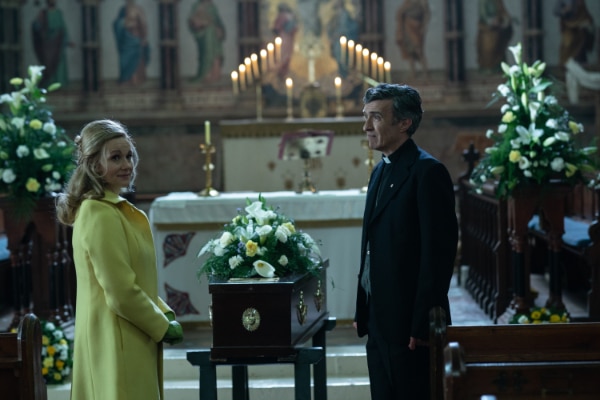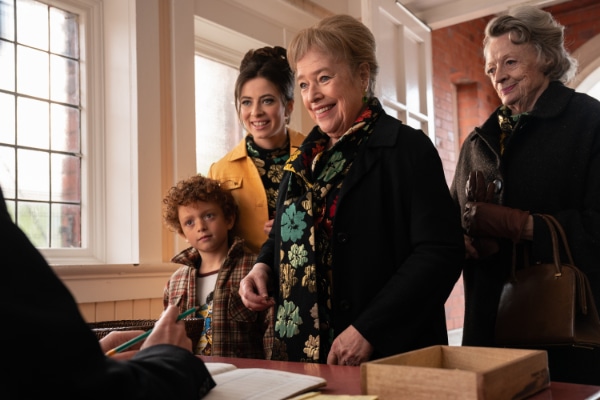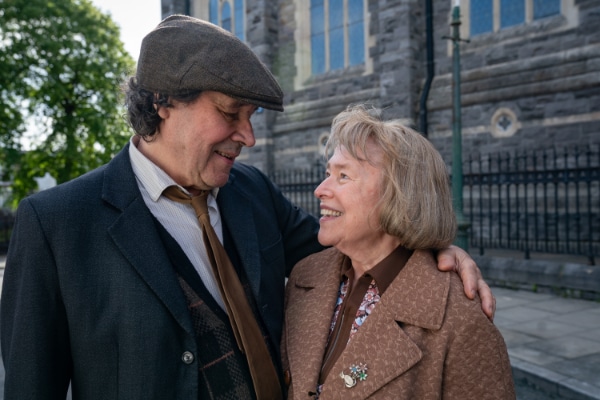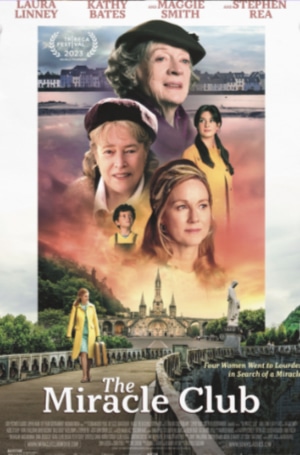You might think that a film about three friends going to Lourdes for a miracle would be considered a faith-based film, but The Miracle Club isn’t one of those overtly preachy movies. Sure, there is plenty of faith to be had, but there’s also doubt, resentment, secrets, and attempts at healing that might leave a viewer doubtful of their authenticity.
Billed a comedy and set in 1967, The Miracle Club begins with the death of Maureen, the local woman in the small Irish village of Ballygar, who’s been planning a fundraiser at the parish. The prize is a trip to Lourdes. When Maureen’s daughter, Chrissie (Laura Linney) shows up from America, there’s no one in the church. Father Byrne (Mark O’Halloran) explains that Maureen would have wanted the fundraiser to go on and people are there instead.
Walking into a room full of Maureen’s friends, Chrissie’s presence immediately brings festivities to a halt. Lily (Maggie Smith), Eileen (Kathy Bates), and Dolly (Agnes O’Casey), three of Maureen’s best friends, give Chrissie the cold shoulder and wonder where she’s been for the past 40 years.

Photo credit: Jonathan Hession. © 2023. Courtesy of Sony Pictures Classics.
Lily often visits the memorial to her son, Declan, drowned 40 years prior. Eileen has just discovered a lump on her breast. Dolly’s 4-year-old son, Daniel (Eric Smith) has never spoken. Each of them needs a miracle. They set off on their pilgrimage to Lourdes, but before the bus pulls out of town, Chrissie joins the group, to everyone’s surprise.
When Chrissie and Lily end up rooming together, their conversations start to break down walls and the story of what happened all those years ago slowly comes out of hiding. Since Eileen and Chrissie were best friends, they need healing, too.

Photo credit: Jonathan Hession. © 2023. Courtesy of Sony Pictures Classics.
Each woman goes to the healing waters of Lourdes with varying levels of faith. Eileen thinks the whole thing is a sham. Dolly thinks Daniel’s muteness is a punishment from God. Lily seems the most open and Chrissie just seeks healing for a past that was imposed upon her and reconciliation with those she loved and lost.
For the most part, The Miracle Club is light fare with the antics of the ladies providing a good dose of humor. It’s too bad that these amazing actors didn’t have a more substantial script to work with. Themes of forgiveness and reconciliation are strong. The film’s treatment of abortion was ambiguous, although compassionately handled. It’s treatment of what is or is not mortal sin, could also be confusing for some viewers. If that describes you, here is a link to an article that could help.
As the bus leaves Lourdes to return to Ireland, Eileen complained about no miracle. Father Byrne tells her, “You don’t come to Lourdes for a miracle, but for the strength to go on when there is no miracle.” The miracles these ladies experienced might not have been the ones they were looking for when they set out on their journey, but God gave them miracles, nonetheless.

Photo credit: Jonathan Hession. © 2023. Courtesy of Sony Pictures Classics.
Isn’t it the same with us? If we have the eyes to see, we will notice those miracles that come to us every day.



